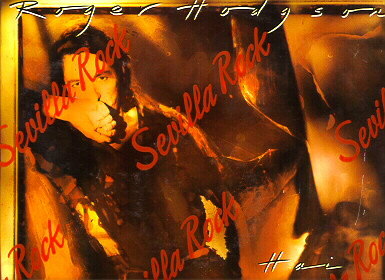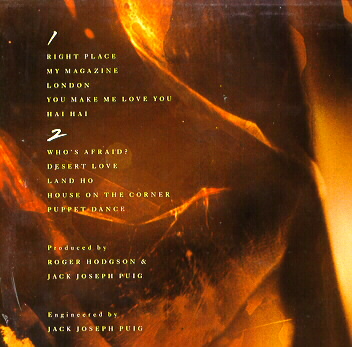
"HAI HAI" SPECIAL REVIEW
In 1987, at the same time Supertramp released a new album called "Free as a bird", Roger Hodgson released his second solo work called "Hai Hai". An album with a very good technical support and very good musicians including Jeff Porcaro and David Paich, written in a very critical moment of his life, although the results weren't very good; even Roger has always confessed he never was happy with that record.
I want to dedicate this small tribute to all Roger fans who consider this album his masterpiece as I do, and recuperate a small interview where Roger tells us how he composed the songs and his personal opinion about this whole work. It's been fantastic that a remastered CD has been released after thousand of fans asked for it to AM records.


Interview made in 1988
Click on the songs marked off to hear a sample (MP3 files)
I.- It's obviously taken you a long time to record Hai Hai, was this all recording time? Did you write an excess of the 10 songs in the album? Why did it take you three years to make this record?
R.- It's taken a long time for a lot of reasons, one of the most is that it is the first album that I've used a lot of outside people, outside musicians and programmers... and so I have to get to know a lot of people. The last album, my first solo, I've played most of the instruments myself and so is simpler that way, but I wanted to branch out as well as learning all about the new technology, get to know a lot of outside musicians, so it look a long time to find the right musicians for the songs. I did record about 15 songs, then I pared down to the 10 that comprise the album.
I.- How do you make the decision which songs to leave off and which songs to put on an album like Hai Hai?
R.- Well, there wasn't a concept for this album, it was more just a collection of songs, so really the songs that succeeded, the most that fulfilled their potential. There were some longer songs that didn't happen this time right, maybe they'll be on the next album.
I.- That leads to my next question. Traditionally with Supertramp and also with in The Eye Of The Storm, you featured a lot of long songs, in the region of seven or eight minutes; this album has ten which is more than you normally put on an album, and they're all about the same length, about five minutes long, any reasons for that?
R.- I think if there was a concious effort to this album it was in trying to have fun and stretch my musical muscles and play with other people and also in performing. As I said, there were some longer songs, there were some eight minute songs that didn't make it on this album just because I didn't captured the performance that I was happy with, and so it just happened that the songs that worked out the best were the shorter songs.
I.- Like Supertramp's Famous Last Words and your first solo album, Hai Hai was recorded at your home 48 tracks studio, any reasons for this? do you ever long to go elsewhere to record?
R.- Yes, actually I'm going to record elsewhere more in the future. This album was mostly recorded in Los Angeles and Nevada City. We tried every different scenario you can imagine... I flew musicians up here, I flew to Los Angeles to work with the same musicians, just to see which would work the best, so this album was made in a variety of different ways.
I.- How did you hook up with some of the musicians you play with them in this album, you worked with some of the top people, such as Nathan East, Jeff Porcaro, David Paich, Dan Huff...
R.- It was really through Jack Joseph Puig, who is my coproducer and engineer on this album, and although we worked together before on an album that I scraped, in fact, called Sleeping With The Enemy, it was the musicians that he knew about and felt that I would get on with, and I'd click with, we ended up working with. But first of all I had to get to know Jack and we had to do a lot of working relationships, so there were a lot of experimenting with different musicians and he put in much nail the musicians, that I worked with the best.
I.- If there was one thing you wanted to do for the listener with this album, what was it?
R.- I wanted to make an album that just made people feel good and gave them energy. In The Eye Of The Storm was a little serious, it happened at a serious time in my life, I'm not saying this album didn't happen in a serious time, this album, as I said, was not an easy album to make, but I just wanted to capture some fire on this album and play with my fire energy. And hopefully give people some fire energy out the world.
I.- The album has an interesting title, Hai Hai, what does it mean and how coming it's the title of the album?
R.- Well, it goes back again to the difficulty I had with this album, it went on a long time and there were definite periods when I thought that I would just give up and scrap the whole thing and Hai Hai, in a way, represents a victory cry. Initially this album was gonna be called What Happened With The Empire? Maybe it was more conceptual back then, when I had that title, but what it ended up has been mainly a collection of songs with a lot of energy, I mean, there's actually one down tempo song on the whole album, so I think Hai Hai, it literally means Yes Yes in Japanese, it's just a positive cry for me: yes! yes, I've done it! for the second time I've made it.
I.- There is a wonderful and refreshing blend of wisdom and innocence in your lyrics, lines like "fee, fi, fo, fum...", "roller-coster", "ghosts and goblins", "who's afraid of the wolf?"... that part that touches the child in all of us, do you still feel at times like a child? Do you feel that innocence?
R.- I think the older you get the more difficult it is to keep in touch with that chil part of yourself, as life beats you up on every level it's easy yo get cynical and bitter, and as the body cannot stop stiffening up, it's easy to feel cheated or downhearted by life, and I think one of the arts of growing old gracefully is to keep in touch with the child part of yourself, and the hope, the faith and the wonder of life. Very few old people have that spark in their eyes still, and I think that one of the challenges of life is to trying to hold on to that spark or even to candle it if it fades to some point as you get older. And I guess there is a large part of child in me that's been beaten up a little bit these last few years (Roger smiles...), but yeah, I guess it still comes through in my songs and in my music.
I.- In Who's Afraid?, the song we are listening to, you speak of something coming in the Eastern sky, and we know the Sun rises in the East, but are you speaking of a different kind of Eastern light?
R.- There's always been a magic about the East, churches face the East, if you meditate it's best to face the East, the wisdom of the East, of India, it just symbolizes a lot of wisdom, enlightment and hope... and I just wanted the Eastern sky to base and symbolize that, just the hope and strength coming from the East.
I.- House On The Corner is a very powerful song, what was your inspiration for that one?
R.- House On The Corner turned out to be a song basically about a guy who'd been wounded on a very very deep level by having to go and fight in a war, and the difficulty he has in adjusting to normal life when he gets back. I mean, he can't forget the pain and yet he needs to be understood and yet no one can understand what he's gone through. Obviously I haven't had that experience but I tried to delve into what it must be like to come back and never being the same ever again.
I.- Now we come to Puppet Dance, which is the last song on the album and one of the most provocative songs you've ever written, what was behind that?
R.- Puppet Dance was interesting because it's about losing a loved one and experiencing some of the feelings that you do when you lose one. At the time I wrote it I hadn't lost the love one, it was strange actually, I guess I tried to imagine what it would feel like. I wrote this song, and around the time I was actually singing in the studio my father died, and so I had all kind of experiences to go through at that time; but it seemed to also happen at a time when a lot of people around me were losing loved ones, so it's just one of those songs that I'm not sure where it came from, but it kinda came before it happened for me anyway.
I.- What's your favourite song on Hai Hai?
R.- I think the one I get the biggest kick out of it's My Magazine. It's a new side for me, I'd never screamed on a record like this before, I kinda get a kick out of it.
I.- Any thoughts on You Make Me Love You, which we were playing before?
R.- Well, You Make Me Love You was an interesting song, because actually I finished the album, and I was so excited that having finished all my singing and all the playing parts that I went to a little Casio that I have down on my house, and I was so overjoyed that having finished that I started playing this Casio and this song came to me. And when people heard it they told me to put it on the album and I thought: oh no!
I.- Do you like to record mainly new songs on an album or do you like to have a cross section of songs you have written over the years?
R.- I think the most gratifying songs are always the new ones, 'cause they're fresher, they're the most vital, they're the most exciting, because they are just newer. It's always good to have a backlog of songs, as you can take different styles that come through the years. I'm lucky on that respect, I mean, on this album I've put Land Ho, which is 14 years old, and, as such a pretty old song for me, it really is there because so many people loved that song and it got buried, and I decided to give it one more shot to see if I could recapture the essence of the song because so many people liked it. I don't know whether I'll ever delve that far back again, because it was a difficult song to get the energy to do one more time, but it's good to have songs from different periods.